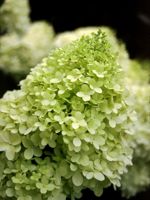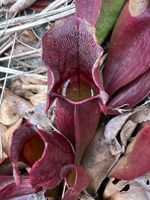Mon-Fri 9am - 5pm Mountain time
Limelight Hydrangea vs Purple Pitcher Plant
Hydrangea paniculata Limelight
Sarracenia purpurea
NOT AVAILABLE THIS SEASON - MIGHT RETURN
CUSTOM GROW
Limelight Hydrangea is a flowering shrub that is known for its green flowers. As they mature, the flower colour changes from a pale green to a creamy white, followed by shades of pink and red. Hydrangea flowers persist longer compared to other flowering shrubs, blooming from late July into fall. They are a popular choice for flower arrangements.
The Limelight Hydrangea can be grown as a stand alone shrub, as a hedge, or incorporated into a flower garden. Blooms occur on new wood, so regular pruning is encouraged in late winter. This is an award winner from the Proven Winners® collection.
Purple Pitcher Plant is a native carnivorous plant, easily recognized by its purple-tinged, tubular pitchers that capture and digest insects. The nectar along the rim attracts insects to the pitcher, where slippery surfaces and downward-pointing hairs cause them to fall into the fluid below. Once inside, they are broken down, providing nutrients that allow the plant to thrive in nutrient-poor soils.
The plant produces nodding, purple-red flowers held high above the leaves. Interestingly, these blooms are pollinated by the Pitcher Plant Fly (Fletcherimyia fletcheri), whose larvae live in the fluid of the pitchers and feed on some of the trapped insects. It can be found in bogs, fens, and other wetlands. It is well-suited for wetland gardens, restoration, and naturalisation projects.
The Purple Pitcher Plant can be challenging to grow because of its specific requirements. It thrives in consistently moist (but not waterlogged), acidic soil, with a peat-and-sand mix typically recommended. The plant is sensitive to fertilizers, dissolved salts, and chlorinated water. When given the right conditions, full sun will bring out its brightest colors.
The Purple Pitcher Plant is the provincial flower of Newfoundland & Labrador.
Limelight Hydrangea Quick Facts
Purple Pitcher Plant Quick Facts
Toxicity: toxic to dogs, cats, and horses

